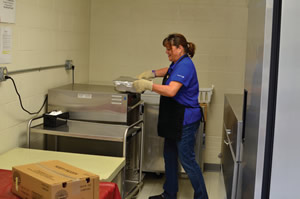Should I or Shouldn't I? Facing the Outsourcing Decision

PHOTO COURTESY OF DISTRICT 58’S COMMUNITY RELATIONS OFFICE
David Bein, SFO, Assistant Superintendent for Business and chief school business official for Downers Grove Grade School District 58, in Illinois, is struggling with his outsourced special education bus transportation service. This is because Chicago is experiencing a significant shortage of school bus drivers, which is causing challenges in staffing bus routes.
“Right now our special education transportation provider is horrible,” Bein explains. “They don’t have enough drivers. They have called us on more than one occasion to say, ‘Oh, by the way, we can’t run these three or four routes any more because we just don’t have drivers,’ and that’s after they don’t pick up students. It has been this way for all of this school year and much of last school year.”
As you can imagine, Bein finds the situation frustrating. On one hand, he wishes he were a little more in control of his destiny — that he had the drivers and buses. Then he’d know exactly who is getting picked up when and where. “Especially with special education students,” he says, “who need routine. And their families have enough challenges without also having to worry if their children are getting picked up.”
On the other hand, he’s not sure he could find bus drivers if the operation were brought in house. “It comes down to wages,” he explains. “Wages for bus drivers have grown 30 percent in this area in the last year, so it makes it difficult to control costs.” And he appreciates that, with a contract in place, he has some protection against cost increases: “In a rapidly rising wage market, my costs have not grown as much as they would have if I had the service in house.”
After last school year’s challenges, Bein strategized how to minimize challenges for this school year, opting to place a target bid for some routes that he knew his vendor couldn’t handle. “We received a couple of bids, and the low bidder has worked out great,” he says.
But, Bein’s problems have continued into this school year, when the vendor indicated there were more routes they could no longer handle. He contacted the company that won the recent bid, as well as a larger player in the market, and found someone to take the routes. He also substituted cab rides for some students.
“We told our vendor that, to the extent that our costs are higher, you have to pay the difference,” Bein says. “We shouldn’t be on the hook for any more expense just because they can’t perform the work stipulated in the contract.”

PHOTO COURTESY OF DISTRICT 58’S COMMUNITY RELATIONS OFFICE
The Right Choice. Challenges can and do occur in any part of school business, requiring officials to problem solve to the best of their abilities. The question isn’t whether outsourcing is right, but if it’s right for your specific situation. Factors like cost, the capability to provide the service and the ability to maintain the service to reasonable standards must be considered when weighing the option of outsourcing.
Bein thought about terminating the contract mid-year. But doing so meant having an option for transporting students, which he didn’t have. “Most firms don’t have idle buses and drivers just sitting around mid year,” he indicates.
Bein decided that the next step in solving his special education transportation challenges was to rebid, which he did. “The service has been so bad that we had to get out of the contract,” he says. “With the new bid and renewing the regular education transportation contract, our costs are definitely higher. But we were able to hold the renewal rate to a five-percent increase, a tolerable level, where our colleagues are seeing a 10-percent cost increase.”
In spite of these challenges, Bein finds that there are compelling reasons to outsource. “I have worked with outsourcing throughout my career,” he notes. “I have worked with some services that are outsourced and some that are not. I can’t make an argument to bring back in house some of the things I’ve outsourced. If I had a strong belief that it should be 100 percent one way or the other, I would make a committed move in that direction.”
More, while Bein has had his challenges with outsourcing special education transportation, challenges can and do occur in any part of business without warning, requiring school business officials to problem solve to the best of their abilities as any business official in any industry must. The question then, isn’t whether outsourcing is right, but if it’s right for you.
Which raises a question: How do you know when it’s a better use of resources to outsource a service than it is to keep it in house? Karen Stinson, expert in digital and IT transformation at New York-based PA Consulting Group, sites three factors. The first is cost. “Cost is one factor, but it’s not the only factor, and it shouldn’t be the most important factor,” she says.
And Bein agrees. “There may be times where outsourcing is cost neutral, and it still makes sense to do it,” he indicates. “There also may be times when, just looking at the pure dollar basis, it may cost more and it still makes sense to outsource.”
This is because of the second factor, which is capability. Do you have the capability to offer the service in house, and is it to your competitive advantage to maintain the service? Bear in mind, says Stinson, that employees are the most expensive line item on your balance sheet.”
The third factor is the timeline to transform a service. “Do you have the core technology to come up to speed and enhance the service and keep on par with the industry as it changes?” Stinson asks. Think of it from a merger/acquisition strategy point of view: Can you grow to scale and maintain the service as is or better via outsourcing or doing it yourself?

PHOTO COURTESY OF DISTRICT 58’S COMMUNITY RELATIONS OFFICE
The school business official plays a vital role in considering these factors and determining if it’s a better use of resources to outsource a service than it is to keep it in house. Having been through it, Bein and Richard Weeks, a retired school business official who serves as mentor to New England school business officials and has 20 years outsourcing experience, offer seven insider strategies to make the process a bit easier.
1. “For decision-makers such as school boards and superintendents, I prepare a simple, one-page chart with financial data accompanied by written notes,” says Weeks. “The chart typically includes five columns of data: the current fiscal year, the previous fiscal year and a forecast of the upcoming three fiscal years.”
2. “Remember the old adage: Don’t estimate when you can calculate,” Weeks says. “If you have enough time to figure something out, don’t estimate. When delivering your cost-estimate, clarify which data has been calculated and which data has been estimated.”
3. “Always look for unintended consequences of outsourcing,” says Weeks. “A proposal to outsource special education testing and tutoring services could jeopardize the district’s receipt of federal grants, which pay the wages of the district’s special educators. This would be a ‘lose-lose’ proposition.”
Bein agrees, citing food service as an example. “Many school districts participate in the national lunch program and have to comply with those regulations,” he says. “Different states oversee that process differently. Illinois is heavy handed in providing oversight and compliance. So it makes it challenging to write in exactly what we want for our food service program, and it goes through review at the state level before we release the bid.”
4. “Allow at least one fiscal year of time and preparation to outsource an operation,” says Weeks. “Retain good labor counsel to review all aspects of the plan to ensure it works. And expect potential displaced workers to offer concessions to save their jobs.”
5. Write a strong contract. “Be super clear in what you want,” says Bein, “otherwise you’ll get something that meets the stipulations of the contract but doesn’t meet your needs. Writing in criteria that’s measurable and fair allows bidders to know what’s important and how to bid it, and allows you to make a fair selection of a bidder.” He notes that this can be challenging with some services, such as food service, where you may want to say, “I want food that tastes good,” but can’t because it’s difficult to judge compliance.
6. Consider a pre-bid meeting, which allows you to verbally explain what you’re doing and why. In the last district in which Bein worked, he wanted to upgrade the food service program, including better quality and more freshly made food. He also wanted to introduce meals that complied with Halal requirements for an Arabic population. There were some things that were easy to write in the bid criteria. “But writing in, ‘I want to step up the quality of the food’ is difficult because it’s difficult to measure,” he notes. “I wrote the criteria as best I could and got approval from the state. Then at the pre-bid meeting I was able to verbally explain my expectations, indicating that, if we start the program and I don’t believe the food is a step up, we’ll have issues.”
For some services, such as custodial and food, a pre-bid meeting is not an option. Vendors need to tour the facilities — actually see the space — to know what it will take in terms of labor and equipment to support the operations.
7. “Educational institutions and business enterprises share this in common: Employees are being replaced by outsourced workers at an alarming rate,” says Weeks. “There is a high probability that technology and robotics will soon replace many of those outsourced workers. Give your soon-to-be terminated employees solid career counseling. Encourage them to improve their skills and look for jobs in other careers.”
When it comes to the outsourcing decision, there’s a lot to work through. The benefit of investing in the process and researching every angle, however, is reaching a solidly made decision upon which you can stand and move forward with confidence.
This article originally appeared in the issue of .